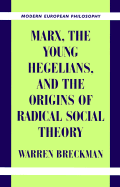Book contents
- Frontmatter
- Contents
- Acknowledgments
- Introduction
- 1 At the End of Idealism: From “Nihilism” to “Positive Philosophy”
- 2 The Transcendent Sovereign and the Political Theology of Restoration
- 3 Ludwig Feuerbach and Christian Civil Society
- 4 The Social and Political Discourse of Personality, 1835–1840
- 5 Pantheism, Social Question, and the Third Age
- 6 Arnold Ruge: Radical Democracy and the Politics of Personhood, 1838–1843
- 7 Karl Marx: From Social Republicanism to Communism
- Conclusion
- Bibliography
- Index
6 - Arnold Ruge: Radical Democracy and the Politics of Personhood, 1838–1843
Published online by Cambridge University Press: 11 January 2010
- Frontmatter
- Contents
- Acknowledgments
- Introduction
- 1 At the End of Idealism: From “Nihilism” to “Positive Philosophy”
- 2 The Transcendent Sovereign and the Political Theology of Restoration
- 3 Ludwig Feuerbach and Christian Civil Society
- 4 The Social and Political Discourse of Personality, 1835–1840
- 5 Pantheism, Social Question, and the Third Age
- 6 Arnold Ruge: Radical Democracy and the Politics of Personhood, 1838–1843
- 7 Karl Marx: From Social Republicanism to Communism
- Conclusion
- Bibliography
- Index
Summary
Reporting on political literature in Germany for the Revue des deux mondes in 1844, the French writer René Taillandier complained of the Young Hegelians' “bizarre, half-theological, half-republican speech.” Taillandier's dyspeptic description applied particularly well to Arnold Ruge, who viewed himself as undertaking in politics the same kind of critique that Strauss and Feuerbach had pursued in theology. Indeed, as these figures had done in the domain of theology, Ruge set the political agenda of the short-lived Young Hegelian movement. From the death of Eduard Gans in 1839 until the suppression of the Deutsche Jahrbücher in 1843, Ruge was inarguably the most prominent progressive Hegelian political writer; but, unlike Gans, Ruge launched a fundamental assault on Hegel's political system. Again in contrast to Gans, the path of Ruge's thinking also led him away from the main tenets of liberalism. More forcefully and clearly than any other Left Hegelian prior to Marx, Ruge marked the departure of the radical Left from liberalism. However, because Ruge was a tireless champion of freedom of the press and representative government, many earlier scholars have chosen to label him a liberal, one of the leading figures of a German “bourgeoisie” struggling for emancipation. Assimilated to the German liberal tradition by this view, he has also thereby come to share in its great putative flaw, its trust in power and its willingness to identify freedom with the state. Ruge's idea of the “absolute state” and his support of Bismarck in the last years of his life would seem to place him in the vilified tradition of nineteenth-century German liberals who became idolators of the Machtstaat after the failure of the Revolution of 1848.
- Type
- Chapter
- Information
- Marx, the Young Hegelians, and the Origins of Radical Social TheoryDethroning the Self, pp. 221 - 257Publisher: Cambridge University PressPrint publication year: 1998



